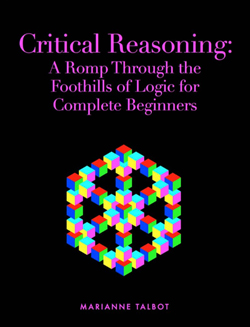Reasoned decision for 'Critical Reasoning'
When Marianne Talbot, our Director of Studies in Philosophy set about finding a publisher for her third book, 'Critical Reasoning: A Romp Through the Foothills of Logic', she took the decision to look no further than herself.
 Joining a growing number of academic authors (and reflecting a global trend in academic publishing) Marianne decided to publish the book herself, as an e-book. Below, she explains why this route was the right choice for her - and for her readers.
Joining a growing number of academic authors (and reflecting a global trend in academic publishing) Marianne decided to publish the book herself, as an e-book. Below, she explains why this route was the right choice for her - and for her readers.
------
'I have just published an e-book. It is called Critical Reasoning: A Romp Through the Foothills of Logic. It is not available in hard copy.
'Writing an e-book was a leap of faith. Cambridge University Press published my last book (Bioethics: An Introduction). They did the peer-reviewing, editing, proof-reading and marketing. They have the clout that gets academic books noticed.
'For my e-book I had to do everything. Members of the Faculty of Philosophy volunteered for peer-reviewing, a friend (who once edited a section of a national newspaper) edited it, pedantic students proof-read it. Another friend, Chris, actually put the book online (developing some wonderful widgets to make the ibook interactive). I am marketing it myself.
'So why subject myself to such work and worry? Why not take the easy way out?
'There are three answers: the price, the environment and the future.
(a) The Price
'Bioethics: An Introduction is beautiful. I am proud to have written it. But it cost £29.99 in softback, £60 in hardback and I want to write books people can afford, books to which everyone has access.
'My podcasts have been downloaded over 4 million times. I get fanmail from all over the world. I have over 2000 Friends on Facebook and followers on Twitter. Many of those who write, or who 'friend' or follow me, are from developing countries. They impress on me their burning desire to learn.
'These people do not live in university cities with excellent libraries and well-stocked bookshops. They are not near Departments for Continuing Education that have open access classes and regular Open Days. For such people £29.99 (plus postage and packaging) is not pin money.
'My e-book costs £5.99. It is available to anyone with internet access. I think this is brilliant.
(b) The Environment
'Since writing Bioethics: An Introduction I have been hugely conscious of the global warming that is leading to climate change. Whether or not this change is man-made (I believe it is) it is clearly happening. Trees soak up the carbon emissions that are a concomitant of our profligate lifestyle.
'I don't know how many trees Bioethics used up. But no tree has been felled in the production of Critical Reasoning: A Romp Through the Foothills of Logic.
(c) The Future
'The Open Access Movement hopes to make all published academic papers available freely on the internet. The movement is growing. Nearly all research funding bodies now require papers that emerge from the research they fund (often courtesy of the taxpayer) to be published on the web within six months of publication.
'Until now if you wanted to read an academic paper you had to be a member of a university whose library subscribed to the journal in which the paper was published. Or you had to pay £37 for 24 hours of access.
'I think the Open Access movement is brilliant. I want to contribute to it. I want the fruits of academic research to be available to everyone who wants to read it.
'I realise, of course, that my e-book is not accessible to those without access to e-readers. I am sorry about this. I do not want to exclude anyone. But most people in this situation could access the web if they chose. The people who cannot afford £29.99 do not have choice in the matter.
'So I have written an e-book. It has taken me way out of my comfort zone. I know nothing about marketing, and who knows? It might bomb badly. To which I say, 'Oh well'. To me, the value in publishing an e-book is that it lets me deliver the information into the hands of more people who want to improve their reasoning skills - and who might not otherwise be able to afford it - in the most accessible and environmentally sustainable format possible. And by this measure, I am already declaring Critical Reasoning: A Romp Through the Foothills of Logic a success.'
- iBooks (for Mac users): https://itunes.apple.com/us/book/critical-reasoning/id900680424
- Amazon (for Kindle users): www.amazon.co.uk/gp/product/B00MSUX7E6
Description on Amazon: This book will help you to reason critically; to recognise, analyse and evaluate arguments and to classify them as inductive or deductive. It will introduce you to fallacies (bad arguments that look like good arguments) and, in two optional chapters, to the rudiments of formalisation. Linked to Marianne Talbot's hugely successful Critical Reasoning podcasts (downloaded 4 million times from iTunesU!), and full of exercises and quizzes, the book was written to satisfy demand from fans of the podcasts. Marianne is the Director of Studies in Philosophy at Oxford University's Department for Continuing Education.
Published 20 November 2014
